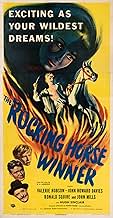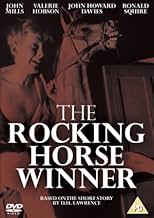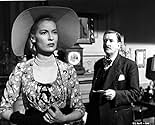IMDb-BEWERTUNG
7,2/10
1506
IHRE BEWERTUNG
Füge eine Handlung in deiner Sprache hinzuA young boy receives a rocking horse for Christmas and soon learns that he is able to pick the winning horse at the races.A young boy receives a rocking horse for Christmas and soon learns that he is able to pick the winning horse at the races.A young boy receives a rocking horse for Christmas and soon learns that he is able to pick the winning horse at the races.
- Regie
- Drehbuch
- Hauptbesetzung
Anthony Holles
- Bowler Hat
- (Nicht genannt)
Melanie Mackenzie
- Matilda Grahame
- (Nicht genannt)
Michael Ripper
- 2nd Chauffeur
- (Nicht genannt)
Johnnie Schofield
- 1st Chauffeur
- (Nicht genannt)
Caroline Steer
- Joan Grahame
- (Nicht genannt)
Empfohlene Bewertungen
I first saw this film as a pare-teen many years ago and it stuck in my memory all these years; I suppose I identified, at the time, with the idea that events could be somehow manipulated and controlled by sheer intensity. When I recently saw this film on DVD, it still struck a nerve and, as an adult, realized what a strong film it is and why it had been in my memory all these years. Because the file is so old, many of the mannerisms in the movie appear quaint now, but the themes are timeless; sensitive kids sensing parental dysfunction and taking it upon themselves to try and "fix" things. It's interesting to note that John Mills, then a staple in English films, produced the film. I would recommend this film to anyone with a penchant for psychological drama of the old school.
This particular D.H. Lawrence story has been done three additional times since this version came out in 1950. They would have to go some to compete with this film for drama and suspense.
I had never seen this film before tonight and the title is so incredibly deceptive. I expected a charming children's fantasy, but got something quite a bit different. One thing I would never do is allow small kids to see The Rocking Horse Winner. They will have nightmare's for years and will NEVER want to get on a rocking horse if you have one.
Hugh Sinclair and Valerie Hobson play a pair of post World War II self indulgent parents who are living way beyond their means, like a lot of folks are today on both sides of the pond. He gambles and she spends money on luxury items like there's no tomorrow. Her brother Ronald Squire bails her out a lot, but he's having no more of it.
All this is having an effect on the United Kingdom's best known child star of the time John Howard Davies. He's the oldest of the three kids and a withdrawn, but sensitive kid who knows there's something wrong.
Davies makes friends with the new handyman John Mills who is a wounded war veteran and before the war used to work as jockey in his youth. When Davies gets among other things a rocking horse for Christmas, Mills shows him how to ride ace-deuce, jockey style. Davies becomes obsessed with the horse and after a while he starts imagining the horse telling him about winning tips at the local track. When he's "really sure" these ponies have a habit of coming in.
Given these plot premises it sounds like you're setting up a comedy, but actually what we get is tragedy here, a stark a bitter tragedy.
Anthony Pellisier wrote and directed and John Mills produced this film for J. Arthur Rank. Pellisier used some unique and terrifying camera angles and makes the rocking horse an incredibly sinister figure. And he doesn't do too bad with his human players either.
The Rocking Horse Winner after almost 60 years still holds up well as one of the most sinister films I've ever seen. Don't be fooled by the title, definitely NOT one to have the kids view.
I had never seen this film before tonight and the title is so incredibly deceptive. I expected a charming children's fantasy, but got something quite a bit different. One thing I would never do is allow small kids to see The Rocking Horse Winner. They will have nightmare's for years and will NEVER want to get on a rocking horse if you have one.
Hugh Sinclair and Valerie Hobson play a pair of post World War II self indulgent parents who are living way beyond their means, like a lot of folks are today on both sides of the pond. He gambles and she spends money on luxury items like there's no tomorrow. Her brother Ronald Squire bails her out a lot, but he's having no more of it.
All this is having an effect on the United Kingdom's best known child star of the time John Howard Davies. He's the oldest of the three kids and a withdrawn, but sensitive kid who knows there's something wrong.
Davies makes friends with the new handyman John Mills who is a wounded war veteran and before the war used to work as jockey in his youth. When Davies gets among other things a rocking horse for Christmas, Mills shows him how to ride ace-deuce, jockey style. Davies becomes obsessed with the horse and after a while he starts imagining the horse telling him about winning tips at the local track. When he's "really sure" these ponies have a habit of coming in.
Given these plot premises it sounds like you're setting up a comedy, but actually what we get is tragedy here, a stark a bitter tragedy.
Anthony Pellisier wrote and directed and John Mills produced this film for J. Arthur Rank. Pellisier used some unique and terrifying camera angles and makes the rocking horse an incredibly sinister figure. And he doesn't do too bad with his human players either.
The Rocking Horse Winner after almost 60 years still holds up well as one of the most sinister films I've ever seen. Don't be fooled by the title, definitely NOT one to have the kids view.
One day, a fine young lad, played by John Howard Davies, gets a wooden rocking horse for a Christmas gift by his favorite uncle, a rich uncle. His father is a butterfingers with money, as he bets and loses it, while his wife, played by Valerie Hobson, is constantly at him, saying they need more money, we simply must have it. She, by the way, is used to having her way and used to living beyond their means. The uncle is her brother who has gotten them out of more than one financial scrape, who now refuses to do it anymore. He's done. The boy discovers by getting on the horse and rocking, that the horse not only talks to him, but gives him tips on the winners at the horse track. By way of betting through the groundskeeper, played by John Mills, the young boy amasses gads of money. And yet, what starts as a fantasy and a somewhat whimsical little film takes a dramatic and scary turn. This film has a little bit of everything for everyone: fantasy, humor, drama, and even a bit of the Gothic touch. The lesson to be learned from this film is simple: do not argue, or discuss money issues, in front of your children. One feels that maybe writer D. H. Lawrence, who wrote the short story from which this was based, may have lived a similar type of childhood but to a degree obviously. If it's draining for an adult, how do you think it makes children feel? This climax is made for a point for all adults - to learn from and change. A very dramatic and memorable film is "The Rocking Horse Winner." All the actors were exceptional, including the young lad, but the real star of the story is author D. H. Lawrence's imagination that tries to teach people the only way he can.
This is a very intriguing British film, quite unlike most others from the period; it's a pretty dark Freudian tale, from a D H Lawrence short story, whose overt depiction of a schoolboy and his magic toy gets away with a strictly taboo subtext. The focus is on a well-to-do household of the period, in which the hierarchy of adults and children is strictly defined; the parents try to keep their son Paul, wearing short trousers even in the depths of winter, innocent of their adult concerns in particular, their problems with money. After discovering that his rocking horse gives him secret powers when he rides it hard enough, with giddy camera-work showing how it feels when he 'gets there', the boy tries to usurp his father's role to provide his mother with what she needs. John Mills produced the film, and his interest was no doubt linked to his typecast image: he normally plays rather piously unimpeachable characters, so it's quite a shock to see him here directing the lad's first experience of 'riding'. The only slight difficulty is that the boy actor needed to be nearer his early teens to carry the weight of the story's darker implications.
Suspenseful, intriguing, disturbing, heartbreaking, atmospherically crafted by director and photographer, this is a gem of a movie that was too out of the rut to be appreciated by audiences in its day. The characters are not only totally believable but so convincingly acted that few viewers will have any difficulty accepting the plot's key supernatural premise. Because they are so credibly realistic, however, some of the people in this movie (the lad's mother and father, for instance) are far from sympathetic. This trait doubtless alienated contemporary audiences even further, particularly those looking for escape into an idealistic world of smilingly duty-bound, hardworking mothers and bumbling yet well-intentioned dads.
As stated, all the players are excellentincluding producer John Mills who cast himself in a small but key rolebut three are so outstanding it would churlish not to mention them individually: Valerie Hobson is perfect as the selfish, socially aspiring mum; John Howard Davies is likewise brilliant as the driven, psychotic boy of the title; and it's great to see Ronald Squire utilizing his talents to the full in a major role.
The pace never slackens and the movie incorporates so many unforgettably powerful scenes, it would be impossible to single just three or four for special praise.
In short: a masterpiece from screenwriter/director Anthony Pelissier (who handled only a handful of movies), photographer Desmond Dickinson and a fine array of artists and craftspeople under the control of actor/producer John Mills.
As stated, all the players are excellentincluding producer John Mills who cast himself in a small but key rolebut three are so outstanding it would churlish not to mention them individually: Valerie Hobson is perfect as the selfish, socially aspiring mum; John Howard Davies is likewise brilliant as the driven, psychotic boy of the title; and it's great to see Ronald Squire utilizing his talents to the full in a major role.
The pace never slackens and the movie incorporates so many unforgettably powerful scenes, it would be impossible to single just three or four for special praise.
In short: a masterpiece from screenwriter/director Anthony Pelissier (who handled only a handful of movies), photographer Desmond Dickinson and a fine array of artists and craftspeople under the control of actor/producer John Mills.
Wusstest du schon
- WissenswertesBassett says that he had "... fine plans for teaching Gordon Richards a thing or two...". Gordon Richards (1904 - 1986) was an English jockey. He was the Champion Jockey in British flat horse-racing 26 times, a record that still stands.
- Zitate
[last lines]
Hester Grahame: I wanted to see the end of it, just wanted to be sure it had gone. Gone for good.
Bassett: You won't never see the end of it, ma'am, nor will I. As long as ever we'll live, we'll remember, and we'll know just what it is was done.
- VerbindungenVersion of Winner (1977)
- SoundtracksSilent Night
(uncredited)
Music by Franz Xaver Gruber
English lyrics by John Freeman Young
Sung by the carollers
Top-Auswahl
Melde dich zum Bewerten an und greife auf die Watchlist für personalisierte Empfehlungen zu.
Details
- Erscheinungsdatum
- Herkunftsland
- Sprache
- Auch bekannt als
- Dobitnik sa drvenog konjića
- Drehorte
- Denham Studios, Denham, Buckinghamshire, England, Vereinigtes Königreich(studio: made at Denham Studios, London, England)
- Produktionsfirmen
- Weitere beteiligte Unternehmen bei IMDbPro anzeigen
- Laufzeit1 Stunde 31 Minuten
- Farbe
- Seitenverhältnis
- 1.37 : 1
Zu dieser Seite beitragen
Bearbeitung vorschlagen oder fehlenden Inhalt hinzufügen



























